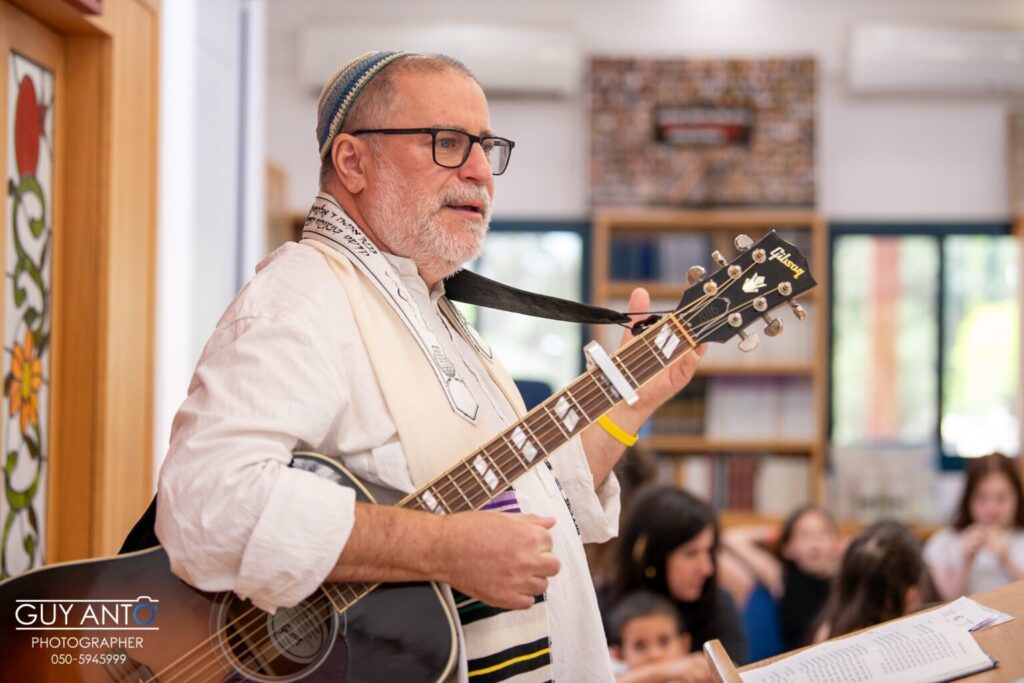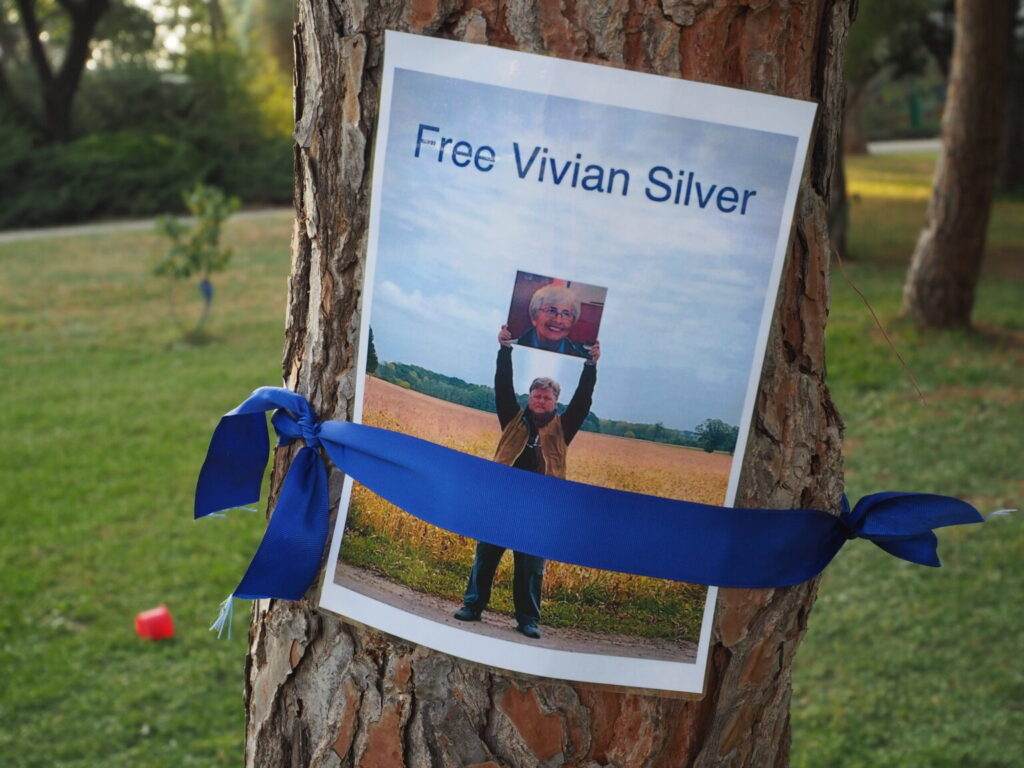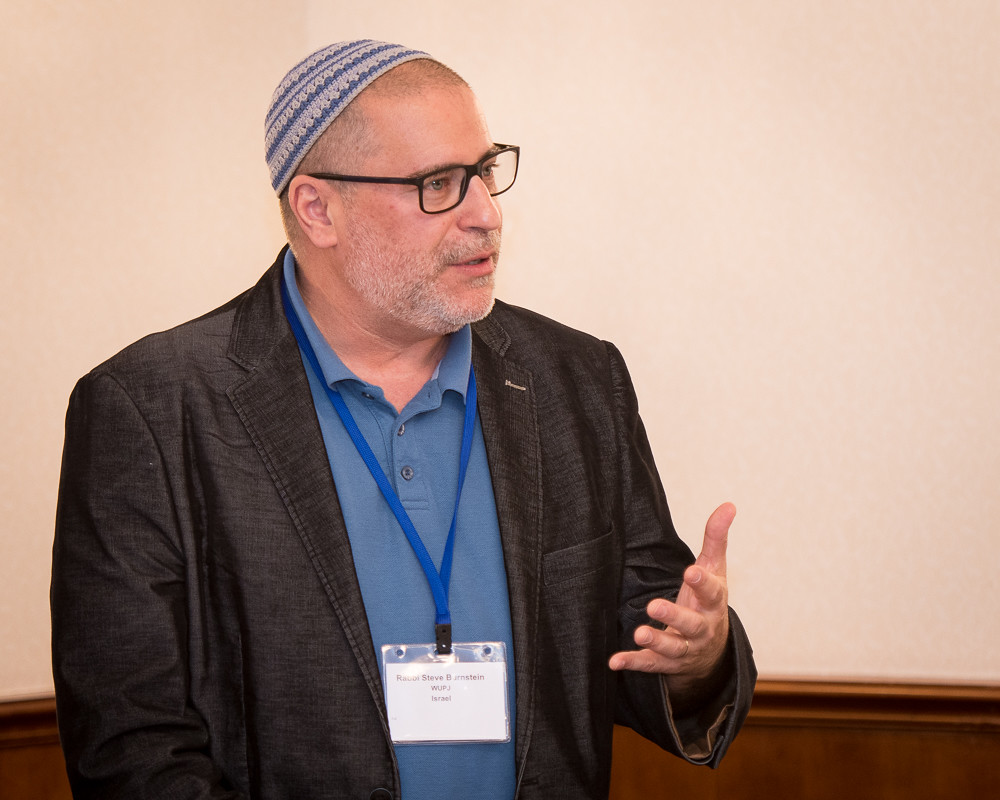When Rabbi Steve Burnstein, RRC ’11, speaks from the other end of a Zoom call, he has a way of shrinking the distance. In describing how his kibbutz community has been impacted by the attacks of Oct. 7, 2023, and all that’s followed, his words somehow reverberate right in the bones.


Originally from Kansas, Rabbi Burnstein has lived in Israel since 1996, except for the years he spent in Philadelphia studying at the Reconstructionist Rabbinical College. He’s a member of Kibbutz Gezer — halfway between Tel Aviv and Jerusalem — and since 2018 has been the spiritual leader of Kehilat Birkat Shalom. Affiliated with the Israel Movement for Reform and Progressive Judaism, Birkat Shalom is based on the kibbutz but serves families throughout central Israel.
Burnstein recently sat for a virtual interview with staff at Reconstructing Judaism, and discussed how Oct. 7 and the subsequent war with Hamas in the Gaza Strip has impacted his community. In advance of Simkhat Torah, he also discussed how that joyous holiday may be forever changed. The Oct. 7 attack coincided with Simkhat Torah. This year, the Gregorian and Jewish calendar dates fall a few weeks apart.
What follows is a transcript of the interview, edited for length and clarity.
Bryan Schwartzman: I understand that your congregation, Kehilat Birkat Shalom, has a member whose brother is still a hostage.
Rabbi Steve: Lee Siegel is a member of Kibbutz Gezer and one of the founding members of our congregation. On the morning of Oct. 7, his brother and sister-in-law, Keith and Aviva Siegel, who are members of Kibbutz Kfar Aza right on the border with Gaza, were kidnapped from their home. On the 51st day after Oct. 7, Aviva was returned during the one and only ceasefire and agreement that we had. But she had to leave her husband Keith behind, and she’s home now with her children, with her family and working tirelessly with Lee — with the entire family — to do everything that they can to get Keith home. And our community, our congregation is doing our best to stand with them, and to support them and support all of their efforts to somehow bring Keith home.
I don’t know how we’re going to ever dance with the Torah the way that we’ve done in the past.
Rabbi Steve Burnstein
Bryan: How will your community approach Simkhat Torah this year?
Rabbi Steve: I don’t know how we’re going to ever dance with the Torah the way that we’ve done in the past. Simkhat Torah in our community has always been an amazing celebration with hundreds of people coming not only from our community but from the wider community. For those of us who have lived through the catastrophe of what we call “Black Shabbat,” “Black Simkhat Torah,” it’s just hard to comprehend how we would turn that into a joyous event. I don’t know.
Bryan: Can you talk about the congregation’s activities over the past year?
I think it’s important to say that over the last year, we’ve had more than 60 bar and bat mitzvah celebrations. The vast majority of these families are not what we would consider members of the congregation or community in the American sense. They’re doing a three-month process of preparation for bar and bat mitzvah. We have now proudly become the synagogue that they don’t go to, where before this, the synagogue they did not go to was an Orthodox synagogue. Yet when they do need religious services, like a bar mitzvah, like a wedding or, God forbid, a funeral, we’re glad that they now know that there’s more than one way to be Jewish, and that they know that we’re here to support them and provide whatever we can to help with their spiritual needs.

Bryan: Has the war forced cancelations of services or celebrations? Or have you had to make unusual accommodations?
Rabbi Steve: There was a family where the father was a commander in a tank unit. He said, Go ahead with the bar mitzvah. I don’t want to delay the celebration. I’ll do my best to get there, but I’m not sure whether it’ll happen or not.’ His brother was a commander in a different tank unit. The brother took his tank in the early morning before sunrise to his brother’s unit, picked him up and brought him out of combat. They had a driver who then brought them, and they showed up for the bar mitzvah ceremony in full combat tank gear. And there wasn’t a dry eye in the house.
Bryan: What has it been like to be a parent this past year? Your daughter, Gavriella, just completed her army service, right?
Rabbi Steve: My daughter, Gavriella, was almost done with the army when Oct. 7 happened and her role was changed from training combat soldiers to staffing funerals. And she spent two weeks going to dozens of funerals, many times for people that she knew. Now, this isn’t somebody who chose to go to war, and her friends who were in combat units didn’t choose to go to war. But their friends, their family members were among those who were attacked, who were killed, who were raped, who were taken hostage.
Bryan: What are you able to do to take care of yourself and bolster your own resilience?
Rabbi Steve: I don’t have any answers. But I’m not alone as a rabbi, as a spiritual leader, whether in providing support for people or in listening to people. It’s a responsibility that all of us have taken on to support our parents and our children and our brothers and our sisters and our neighbors.
Bryan: Is there anything you’d like folks outside of Israel to know or do?
Rabbi Steve: I think maybe the only thing I would add is if you have colleagues, if you have friends, if you have family, if you have people who you aren’t even that close with who live here in Israel, reach out to them. Let them know that you’re thinking about them. You don’t have to agree with the current coalition of the government. You don’t have to agree with the army, because there are many of us here in Israel that are desperately concerned about innocent casualties in Gaza, who are seeking peace and who are seeking an agreement, and who are devastated by what this is doing to the hearts and the souls of our children, and what this is doing to the hearts and the souls of all the people in Gaza as well.





